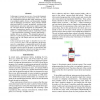Free Online Productivity Tools
i2Speak
i2Symbol
i2OCR
iTex2Img
iWeb2Print
iWeb2Shot
i2Type
iPdf2Split
iPdf2Merge
i2Bopomofo
i2Arabic
i2Style
i2Image
i2PDF
iLatex2Rtf
Sci2ools
110
click to vote
BIRTHDAY
2005
Springer
2005
Springer
Towards Comprehensive Computational Models for Plan-Based Control of Autonomous Robots
In this paper we present an overview of recent developments in the plan-based control of autonomous robots. We identify computational principles that enable autonomous robots to accomplish complex, diverse, and dynamically changing tasks in challenging environments. These principles include plan-based high-level control, probabilistic reasoning, plan transformation, and context and resource-adaptive reasoning. We will argue that the development of comprehensive and integrated computational models of plan-based control requires us to consider different aspects of plan-based control — plan representation, reasoning, execution, and learning — together and not in isolation. This integrated approach enables us to exploit synergies between the different aspects and thereby come up with simpler and more powerful computational models. In the second part of the paper we describe Structured Reactive Controllers (SRCs), our own approach to the development of a comprehensive computational mod...
Related Content
| Added | 26 Jun 2010 |
| Updated | 26 Jun 2010 |
| Type | Conference |
| Year | 2005 |
| Where | BIRTHDAY |
| Authors | Michael Beetz |
Comments (0)

